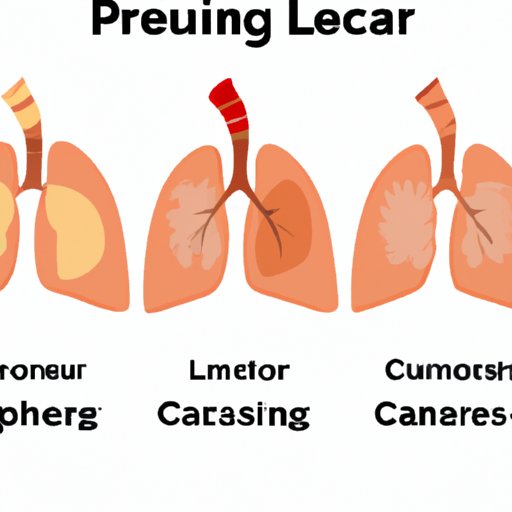Introduction
When we hear the term “pulmonary disease,” we may not immediately understand what it means. Pulmonary disease is a term used to describe a range of conditions that affect the respiratory system, particularly the lungs. In this article, we will explore the symptoms, causes, and treatment options for pulmonary disease, as well as the importance of early detection, lifestyle changes to manage symptoms, connection between lifestyle habits and pulmonary disease, advancements in research and treatment of pulmonary disease, and how environmental factors contribute to lung health. This article is important because it aims to raise awareness about this condition, which affects millions of people worldwide.
Understanding Pulmonary Disease: Symptoms, Causes, and Treatment Options
Pulmonary disease is a broad term used to describe a range of conditions that affect the lungs and respiratory system. It includes conditions such as asthma, chronic obstructive pulmonary disease (COPD), lung cancer, pulmonary fibrosis, pulmonary hypertension, and pneumonia, among others. Symptoms of these conditions can include shortness of breath, chest pain, coughing, wheezing, and fatigue.
The causes of pulmonary disease are many and varied. In some cases, the condition may be caused by exposure to environmental toxins, such as pollutants, chemicals, and cigarette smoke. In other cases, the condition may be genetic or inherited. There are also cases where the cause of pulmonary disease is unknown.
Treatment options for pulmonary disease depend on several factors, including the type of condition, the severity of the symptoms, and the patient’s overall health. Some treatments may involve medications, such as bronchodilators, steroids, and antibiotics. Other treatments may include oxygen therapy, pulmonary rehabilitation, and surgery. In some cases, lifestyle changes may be recommended, such as quitting smoking, exercising regularly, and avoiding certain triggers.
The Importance of Early Detection for Pulmonary Disease
Early detection is crucial for the effective management of pulmonary disease. When the condition is caught early, it is easier to treat and can have a better outcome. Early detection also provides patients with more options for treatment and can help to prevent complications from occurring.
Screening methods for pulmonary disease may include a chest X-ray, CT scan, or pulmonary function tests. These tests can help to detect early signs of lung damage or other abnormal changes in the respiratory system.
Early warning signs of pulmonary disease may include shortness of breath, chest pain, coughing, wheezing, and fatigue. If you are experiencing any of these symptoms, it is important to seek medical attention as soon as possible.
Living with Pulmonary Disease: Strategies for Managing Symptoms
Coping mechanisms for pulmonary disease may include deep breathing exercises, relaxation techniques, and support groups. These coping mechanisms can help to reduce stress, manage anxiety, and improve overall quality of life.
Lifestyle changes that can help manage symptoms may include quitting smoking, exercising regularly, and avoiding triggers such as air pollution and other environmental irritants. In addition, pulmonary rehabilitation programs can be helpful for patients with pulmonary disease. Pulmonary rehabilitation programs are designed to help patients strengthen their lungs, improve their breathing, and increase their overall fitness level.
Benefits of pulmonary rehabilitation programs may include improved lung function, reduced symptoms of wheezing and shortness of breath, increased exercise tolerance, and a decreased need for hospitalization.
The Link Between Lifestyle Habits and Pulmonary Disease
There is a clear connection between smoking and pulmonary disease. Smoking is the leading cause of COPD and lung cancer. Other lifestyle factors that contribute to lung health include poor nutrition, lack of exercise, and exposure to environmental toxins such as air pollution and occupational hazards.
It is important to avoid triggers and risk factors for pulmonary disease. This can include avoiding exposure to secondhand smoke, wearing a mask to protect against pollution, and avoiding occupational hazards that may expose you to respiratory irritants.
Advancements in Research and Treatment of Pulmonary Disease
There have been many recent advancements in the field of pulmonary disease research and treatment. For example, there are new medications available that can help to manage symptoms and slow the progression of the disease. There are also new surgical techniques that can be used to remove damaged lung tissue and improve lung function.
Future advances in treatment may include gene therapy, stem cell therapy, and new technologies for detecting and monitoring the disease.
How Environmental Factors Contribute to Pulmonary Disease
Pollution and other environmental factors can have a significant impact on lung health. Exposure to pollutants such as smog, ozone, and particulate matter can cause respiratory damage and increase the risk of developing pulmonary disease.
Steps to reduce exposure to harmful substances may include using air filters to purify the air in your home, avoiding heavily polluted areas, and advocating for policies that promote clean air and environmental responsibility.
Conclusion
Pulmonary disease is a serious condition that affects millions of people worldwide. Early detection, lifestyle changes, and appropriate treatment can help to manage symptoms and improve quality of life for patients. It is important to seek medical attention if you are experiencing symptoms of pulmonary disease. By working together to raise awareness about this condition, we can help to prevent future cases and promote lung health for all.
